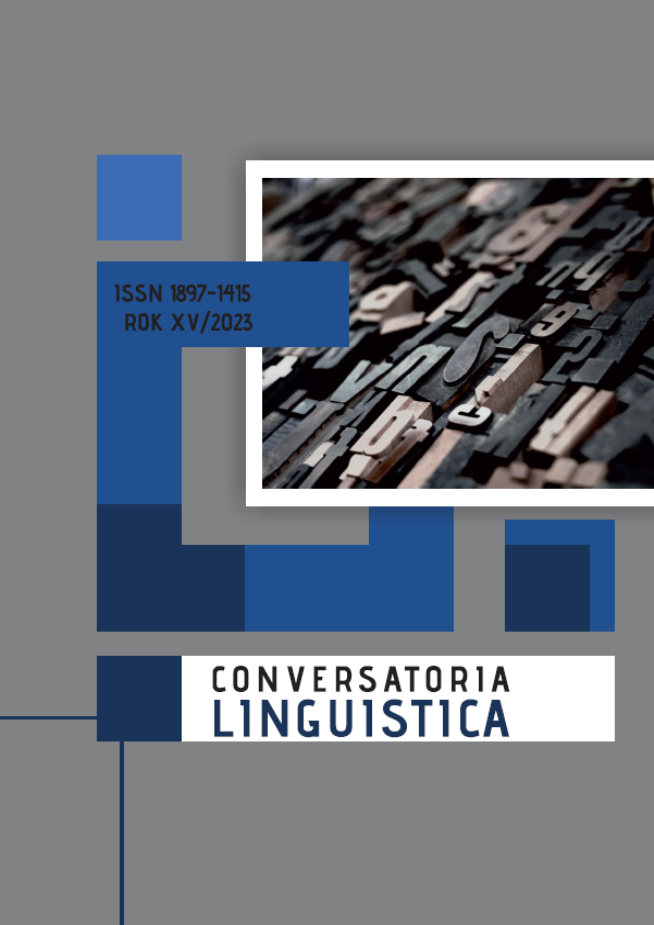On the Conceptualization of “Excellent” in the Serbian Language: An Analysis of Synonyms and the Inner-Word Form
DOI:
https://doi.org/10.34739/clg.2023.15.07Keywords:
odličan, conceptualization of positive evaluation, inner word-form, Serbian languageAbstract
The word odličan ‘excellentʼ is used to express a positive evaluation and has a large number of synonyms, but for many of them the lexicographic sources do not provide information about the possibility of using them for expressing evaluation. Moreover, although the inner word-form of the word odličan speaks only of general standing out from other objects, the word itself is used only in a positive sense. The inner word-form semantic analysis gives the answer to the question why all the analyzed synonyms can be used for giving a positive evaluation. The article draws attention to a deep conceptual relationship between words with the meaning of dobar ‘goodʼ and odličan ‘excellentʼ, because the same basic conceptual metaphors are used in their synonyms (dobar / odličan is up / big). It was also established that words with a positive connotation are found in the inner word-form of synonyms of odličan or in their definitions, including those that indicate a relationship between a positive general assessment and a positive aesthetic assessment. The meaning of odličan differs from “ordinary” objects in such a way that it can be conceptually associated with realm of the fantastic or unreal, which in turn triggers an emotional reaction in the observer. The language reveals that objects that are evaluated positively are treated in a unique way: they are set apart from others, they function as a topic of conversation, they acquire general approval and obtain a special status in society.
Downloads
References
Arutjunowa N.D. (1999): Jazyk i mir čeloveka, Moskwa.
Arutjunowa N.D. (1987): Anomalii i jazyk. K problemie jazykovoj «kartiny mira»,
„Voprosy jazykoznanija” 3, s. 3–19.
Bartmiński J. (2011): Pojam jezičke slike sveta i načini njegove operacionalizacije, w:
Jezik – slika – svet. Etnolingvističke studije, (tłum. Marta Bjeletić), Beograd, s. 41–69.
Grković-Mejdžor J. (2008): O semantici staroslovenskih prideva dobrъ i blagъ, „Južno-slovenski filolog” 64, s. 51–60.
Schneider I.K., B.T. Rutjens, N.B. Jostmann, D. Lakens (2011): Weighty Matters: Importance Literally Feels Heavy, „Social Psychological and Personality Science” 2/5, s. 474–
–478.
Schubert T.W. (2005): Your Highness: Vertical Positions as Perceptual Symbols of Power, „Journal of Personality and Social Psychology” 89/1, s. 1–21.
Stefanović M. (2022): U lavirintu reči, Novi Sad.
Stefanović M. (2022b): Ka opisu koncepta vrednost u srpskom jeziku, „Južnoslovenski filolog” 78/2, s. 711–730.
Stefanović M. (2023, w druku): Vnutrenjaja forma slova i konceptualizacija položitel’noj ocenki: sinonimičeskij rjad s dominantoj «otličnyj», w: Problemy konceptualizacii dejstvitel’nosti i modelirovanija jazykovoj kartiny mira, red. T.V. Simaško, Moskva/Severo-dvinsk.
Yu N., L. Yu, Y.C. Lee (2017): Primary Metaphors: Importance as Size and Weight in
a Comparative Perspective, „Metaphor and Symbol” 32/4, s. 231–249.
Zaliznjak A.A. (2006): Mnogoznačnost’ v jazyke i sposoby ee predstavlenija, Moskva.
Źródła
RMS: Rečnik srpskohrvatskoga književnog jezika 1–6, Novi Sad, 1967–1976.
RS: Rečnik sinonima, Pavle Ćosić i saradnici, Beograd, 2008.
RSANU: Rečnik srpskohrvatskog književnog i narodnog jezika, Beograd, 1959–.
RSJ MS: Rečnik srpskoga jezika. Izmenjeno i popravljeno izdanje, red. i ur. M. Nikolić, Novi Sad, 2011.
Vasmer M. – Ètimologičeskij slovar’ russkogo jazyka v četyreh tomah. Perevod s nemeckogo i dopolnenija O.N. Trubačeva, t. 1–4, Progress, Moskva, 1986–1987.




